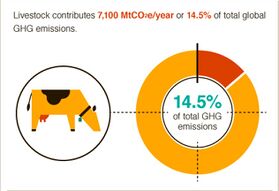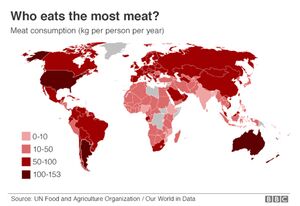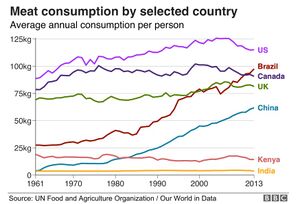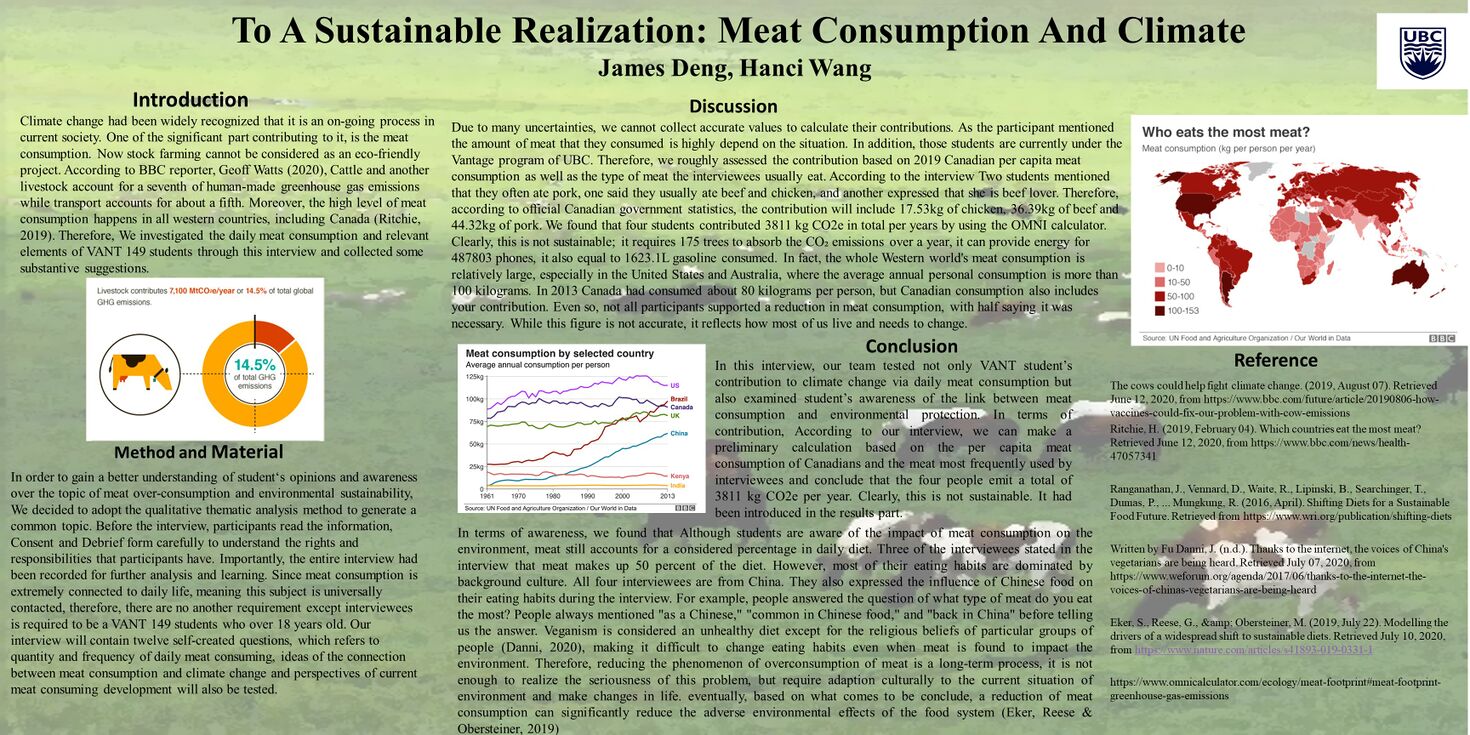Course:VANT149/2020/Capstone/Arts/Team53
To A Sustainable Realization: Meat Consumption And Climate Change
BIOGRAPHIES
James Deng

My name is James Deng. Currently, I am an international student from China under the UBC Vantage program. The inspiration for our research topic comes from an exciting piece about news of Interviewing children about the impact of cow farts on the climate. As a college student, I did not realize the direct impact of cattle on the climate. Therefore, we decided to conduct research in the form of interviews on things related to livestock farming, such as meat consumption, and evaluate how much does vantage students realize and contributed to climate change via their daily meat-eating habits?

Hanci Wang
My name is Hanci Wang, an international student from China studying at UBC Vantage College. We are progressing on the meat consumption connected to climate change. I believe this subject is promisingly developable and widely debatable since meat consumption is universally touched and indeed accounts for a significant contribution to climate change. I am a meat lover that I eat meat in almost every meal, and thus it encourages me to learn the effects of meat consumption, which is why I would devote my energy to this study.
Introduction

Climate change had been widely recognized that it is an on-going process in current society. One of the significant parts that contributor is meat consumption. Now stock farming cannot be considered as an eco-friendly project. According to BBC reporter, Geoff Watts (2020), Cattle and another livestock account for 14.5% of human-made greenhouse gas emissions while transport accounts for about a fifth. Moreover, the high level of meat consumption happens in all western countries, including Canada (Ritchie, 2019). Therefore, We investigated the daily meat consumption and relevant elements of VANT 149 students through this interview and collected some substantive suggestions.
Method and Material
To gain a better understanding of students' opinions and awareness over the topic of meat over-consumption and environmental sustainability, We decided to adopt the qualitative thematic analysis method to generate a common topic. Before the interview, participants read the information, Consent and Debrief form carefully to understand the rights and responsibilities that participants have. Importantly, the entire interview had been recorded for further analysis and learning. Since meat consumption is hugely connected to daily life, meaning this subject is universally contacted. Therefore, there is no other requirement except interviewees required to be a VANT 149 students who over 18 years old. Our interview will contain twelve self-created questions, which refer to quantity and frequency of daily meat consumption, ideas of the connection between meat consumption and climate change, and perspectives of current meat consuming development will also be tested.
Discussion

Due to many uncertainties, we cannot collect accurate values to calculate their contributions. As the participant mentioned, the amount of meat that they consumed highly depends on the situation. Also, those students are currently under the Vantage program of UBC. Therefore, we roughly assessed the contribution based on 2019 Canadian per capita meat consumption as well as the type of meat the interviewees usually eat. According to the interview, Two students mentioned that they often ate pork. One said they usually ate beef and chicken, and another expressed that she is a beef lover. Therefore, according to official Canadian government statistics, the contribution will include 17.53kg of chicken, 36.39kg of beef and 44.32kg of pork. We found that four students contributed 3811 kg CO2e in total per year by using the OMNI calculator. Clearly that it is not sustainable; it requires 175 trees to absorb the CO₂ emissions over a year. It can provide energy for 487803 phones. It also equals to 1623.1L gasoline consumed. In fact, the whole Western world's meat consumption is relatively large, especially in the United States and Australia, where the average annual personal consumption is more than 100 kilograms. In 2013 Canada had consumed about 80 kilograms per person, but Canadian consumption also includes your contribution. Not all participants supported a reduction in meat consumption, with half saying it was necessary. While this figure is not accurate, it reflects how most of us live and needs to change.In this interview, our team tested not only VANT student's contribution to climate change via daily meat consumption but also examined student's awareness of the link between meat consumption and environmental protection. In terms of contribution, According to our interview, we can make a preliminary calculation based on the per capita meat consumption of Canadians and the meat most frequently used by interviewees and conclude that the four people emit a total of 3811 kg CO2e per year. This is not sustainable, which had been introduced in the results part. In terms of awareness, we found that Although students are aware of the impact of meat consumption on the environment, meat still accounts for a considered percentage in daily diet. Three of the interviewees stated in the interview that meat makes up 50 percent of the diet. However, most of their eating habits are dominated by background culture. All four interviewees are from China. They also expressed the influence of Chinese food on their eating habits during the interview. For example, people answered the question of what type of meat do you eat the most? People always mentioned "as a Chinese," "common in Chinese food," and "back in China" before telling us the answer. vegetarianism is considered an unhealthy diet except for the religious beliefs of particular groups of people (Danni, 2020), making it difficult to change eating habits even when meat is found to impact the environment.

Conclusion
Therefore, in concluding, reducing the phenomenon of overconsumption of meat is a long-term process, it is not enough to realize the seriousness of this problem, but require culturally adaption to the current situation of environment and make changes in life. Eventually, based on what comes to be conclude, a reduction of meat consumption can significantly reduce the adverse environmental effects of the food system (Eker, Reese & Obersteiner, 2019). This interview also had brought up a new perspective on sustainable development. Overconsumption is not limited to meat consumption. Reducing population size is not the only things that we need to pay attentions to for environmental sustainability. Reducing over consumption by certain groups can also make our lives more sustainable.
Poster

Reference
The cows could help fight climate change. (2019, August 07). Retrieved June 12, 2020, from https://www.bbc.com/future/article/20190806-how-vaccines-could-fix-our-problem-with-cow-emissions
Ritchie, H. (2019, February 04). Which countries eat the most meat? Retrieved June 12, 2020, from https://www.bbc.com/news/health-47057341
Ranganathan, J., Vennard, D., Waite, R., Lipinski, B., Searchinger, T., Dumas, P., ... Mungkung, R. (2016, April). Shifting Diets for a Sustainable Food Future. Retrieved from https://www.wri.org/publication/shifting-diets
Written by Fu Danni, J. (n.d.). Thanks to the internet, the voices of China's vegetarians are being heard. Retrieved July 07, 2020, from https://www.weforum.org/agenda/2017/06/thanks-to-the-internet-the-voices-of-chinas-vegetarians-are-being-heard
Eker, S., Reese, G., & Obersteiner, M. (2019, July 22). Modelling the drivers of a widespread shift to sustainable diets. Retrieved July 10, 2020, from https://www.nature.com/articles/s41893-019-0331-1
https://www.omnicalculator.com/ecology/meat-footprint#meat-footprint-greenhouse-gas-emissions